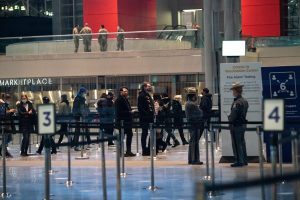
After more than a year of battling with Covid-19, vaccines are available and their distribution is gaining momentum. It seems as though we are finally emerging from the pandemic as many states have lifted some, or all, of the limitations.
Nevertheless, I think we are a bit too quick to jump to conclusions. We are still not conscious enough of how we should relate to one another, and the reckless race to lift the limitations could produce a very negative response. We’re not out of the woods just yet, especially since we still don’t feel how close or far we should be from one another.
The virus is very nimble, mutates easily and quickly, and is now far more contagious than it was when it first appeared. Since we don’t feel how far we need to be from one another—to keep two feet away from this person, and ten feet away from that person—we don’t know how to conduct ourselves.
Also, even when vaccines do work, they don’t inoculate one hundred percent and are only effective for six months or so. Therefore, I see no cause for celebration.
As I have said countless times, nature is smarter than we are; it demands that we overhaul our conduct. This is why it sent us the coronavirus, and the virus will continue to plague us (in various forms) until we comply with nature’s demand.
Currently, whenever we lift the limitations, we revert to the way we lived before: selfishly, and without consideration of each other or the environment. This is exactly why the plague broke out: to compel us to transform our relationships. If we revert to the previous way of life every time we lift the limitations, the virus will keep coming back, and more virulent and violent each time. Only when we start using the forced distance between us to build positive relations, to learn about our mutual dependence, and the necessity to care about each other, we will be able to conduct ourselves in more thoughtful ways and we will not need a virus to keep us from harming one another.
To do this, we must start thinking that by keeping our distance, we are not protecting ourselves, but the ones from whom we keep away. That is, if we, collectively, cultivate a mindset where we see ourselves as infected (even if asymptomatic), and that we must keep away from each other in order not to infect others, then we will stop infecting one another. If we do this, the virus will be gone in a matter of weeks. But even more important, we will have succeeded in our first exercise in mutual responsibility.
This exercise will demonstrate that only through mutual responsibility can we build a secure and successful society, and we will want to cultivate that mindset instead of the reverence we currently have for extreme individualism and narcissism.
Our physical (and emotional) health depends on our social health more than at any time prior. If we want to be healthy, we must first heal our society from corrupt egoism. We must learn to appreciate, and gradually rejoice in our differences. We must come to see that the diversity of human society is required for its strength, and that without people who think, look, and act differently, no one can develop and succeed, since we only develop through contact and communication with different people. When we realize this, we will be able to build a balanced, healthy society, and the virus will truly be gone.
[People wait in a line stretching inside the Jacob K. Javits Convention Center on midtown Manhattan’s west side, to receive a dose of the coronavirus disease (COVID-19) vaccine at the site which has been converted into a mass vaccination center in New York City, New York, U.S., March 6, 2021. REUTERS/Jeenah Moon]